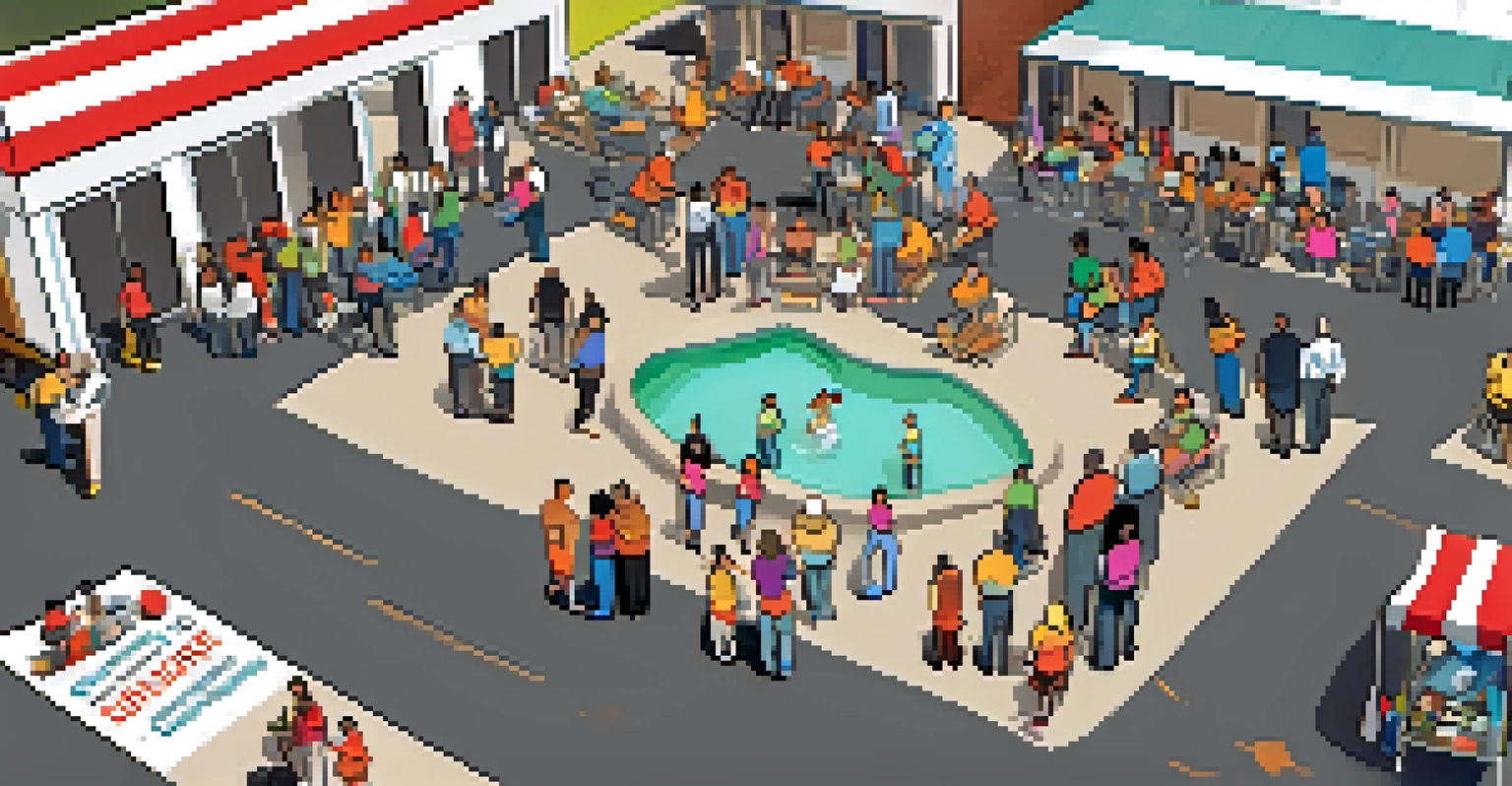Economic Impact of Hurricanes on Louisiana's Communities

Understanding the Frequency of Hurricanes in Louisiana
Louisiana is no stranger to hurricanes, with the Gulf Coast being a hotbed for these natural disasters. Each year, the state braces itself for the potential impact of storms that can lead to devastating consequences. The frequency of hurricanes not only disrupts daily life but also poses significant economic challenges for local communities.
The best way to predict the future is to create it.
Hurricanes like Katrina and Ida have left indelible marks on the state, showcasing the destructive power of nature. These storms often lead to widespread evacuations, property damage, and loss of life, which create long-lasting economic scars. In understanding this prevalence, it's crucial to recognize how these events shape the economic landscape of Louisiana.
Moreover, the cyclical nature of hurricanes means that communities must constantly prepare for the next storm. This ongoing readiness requires significant resources, which can strain local economies and divert funding from essential services and infrastructure projects.
Immediate Economic Consequences of Hurricanes
When a hurricane strikes, the immediate economic impact is often felt in the form of property damage and business interruptions. Homes, businesses, and infrastructure can be severely affected, leading to costly repairs and lost revenue. For many small businesses, just a few days of closure can be the difference between survival and bankruptcy.

Additionally, the cost of emergency services and disaster response can quickly escalate. Local governments often find their budgets stretched thin as they scramble to provide immediate aid and support. This situation can lead to increased taxes or cuts in other essential services, placing further strain on community resources.
Hurricanes Disrupt Louisiana's Economy
The frequent occurrence of hurricanes in Louisiana leads to significant economic challenges, affecting local businesses and communities.
The emotional toll on residents is equally significant, as many face the daunting task of rebuilding their lives. The psychological stress, combined with the financial burden, can have lingering effects on community cohesion and economic stability.
Long-Term Economic Impact on Local Communities
The long-term economic impacts of hurricanes can reshape the very fabric of Louisiana's communities. As neighborhoods are rebuilt, there may be shifts in population and demographics, which can alter the local economy significantly. For instance, some residents may choose to relocate permanently, leading to decreased consumer spending in the area.
Resilience is accepting your new reality, even if it's less good than the one you had before.
Moreover, the rebuilding process often leads to increased costs in construction and labor. This can create a ripple effect, as local businesses may struggle to keep up with rising prices, potentially leading to inflation in certain sectors. Communities may also face challenges in attracting new businesses, as the perception of risk can deter investment.
Ultimately, the long-term economic ramifications can lead to a cycle of poverty for some residents, as they may find it difficult to recover fully. This underscores the need for comprehensive recovery plans that address not just immediate needs but also long-term economic sustainability.
The Role of Insurance in Recovery Efforts
Insurance plays a critical role in the recovery process for individuals and businesses affected by hurricanes. For many homeowners and business owners, insurance is their safety net, helping them to rebuild after disaster strikes. However, navigating the insurance landscape can be complicated, often leaving some without adequate coverage.
In Louisiana, the unique challenges posed by hurricanes can lead to disputes with insurance companies regarding claims. Many policyholders may find themselves underinsured or facing delays in receiving payouts, further complicating their recovery efforts. This situation emphasizes the importance of understanding insurance policies and advocating for fair treatment.
Insurance Is Key to Recovery
Navigating the complex insurance landscape is crucial for individuals and businesses in Louisiana to rebuild effectively after hurricanes.
Despite these challenges, insurance can also drive economic recovery by providing the necessary funds for repairs and rebuilding. This financial support can help spur local economic activity as contractors and service providers are hired to restore homes and businesses.
Government Aid and Economic Recovery Initiatives
In the aftermath of hurricanes, government aid plays a vital role in supporting affected communities. Federal and state programs are often established to provide financial assistance, grants, and loans to help residents and businesses recover. This support can be instrumental in jumpstarting the local economy after a disaster.
However, accessing government aid can sometimes be a bureaucratic challenge. Many residents may find the application process cumbersome and time-consuming, which can delay the recovery process. Simplifying these procedures and ensuring that information is readily available can make a significant difference in how quickly communities bounce back.
Moreover, long-term recovery initiatives can help build resilience against future hurricanes. By investing in infrastructure improvements and disaster preparedness programs, communities can better withstand the economic impacts of future storms.
Community Resilience and Economic Adaptation
Building community resilience is crucial for mitigating the economic impact of hurricanes. Local organizations and governments can implement strategies that focus on disaster preparedness and response, helping residents to adapt to the challenges posed by hurricanes. This proactive approach can foster a culture of resilience within communities.
For instance, community workshops that educate residents about emergency plans and insurance options can empower them to take charge of their recovery. Additionally, encouraging local businesses to develop continuity plans can enhance their ability to weather economic storms.
Investing in Community Resilience
Building community resilience through preparedness initiatives and infrastructure improvements can help mitigate the economic impact of future hurricanes.
Furthermore, fostering connections within the community can lead to collaborative recovery efforts. When residents come together to support one another, the economic burden of recovery can be shared, creating a stronger, more unified community in the face of adversity.
The Future: Innovations in Hurricane Preparedness
As technology advances, so too does the potential for innovation in hurricane preparedness and recovery. From advanced weather forecasting tools to mobile applications that provide real-time updates, communities can leverage technology to enhance their response efforts. These innovations can lead to better preparedness, allowing local economies to minimize disruption.
Moreover, investments in sustainable infrastructure can help communities become more resilient to future hurricanes. For example, creating green spaces and utilizing environmentally friendly building materials can reduce the overall impact of storms while also benefiting the local economy through job creation.

Ultimately, a forward-thinking approach that embraces innovation can help Louisiana's communities better navigate the challenges posed by hurricanes. By prioritizing preparedness and resilience, they can pave the way for a more sustainable future.